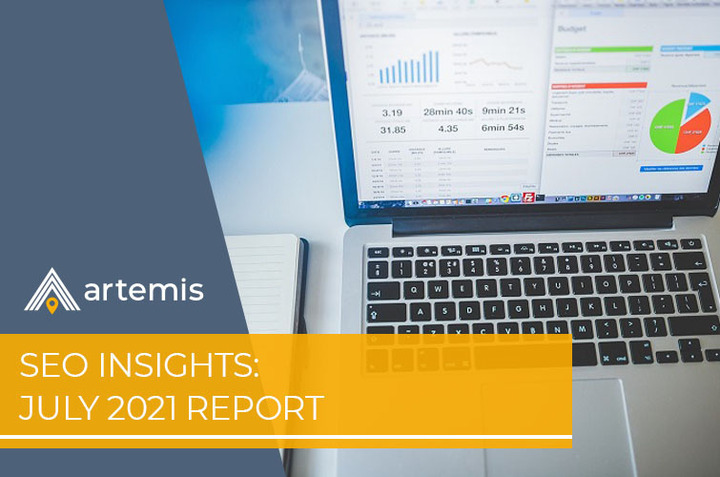SEO Insights – July 2021 Report

Another Core Update
Another month and another core update from Google. On the 1st July, Google released yet another core algorithm update which was a continuation of the update released in June.
Core updates can be quite significant and are based around Google’s better understanding of the intent behind search queries and are designed to improve the overall quality of search results.
We did witness some significant movements in the results with the latest updates, although we can’t always say that the results have been better since they have rolled out.
We will likely see core updates rolling out on a more frequent basis going forward as advancements in technology at Google means that they are able to make improvements to their algorithms and release them at a much faster rate than previously.
It means that we will likely see a much greater level of turbulence in the search results going forward.
Link Spam Update
An interesting new “Link Spam Update” began rolling out at the end of July. This update is designed to better detect and devalue unnatural links.
Although Google has become much better at identifying these in recent years, it appears that as part of this update Google is trying to get Webmasters to properly tag paid-for, affiliate and user-generated links accordingly.
Back in February 2020, Google changed how it handled links tagged as “nofollow”. Whereas previously Google would obey and not follow any links marked up with the nofollow attribute, in February 2020 they changed how they handled this and the nofollow attribute became a signal instead of a directive. It meant that Google would now choose whether or not to follow links marked as nofollow.
One of the main reasons why Google likely made this change is that its algorithm relies heavily on links and the authority that they pass to other pages and websites. In fear of getting penalised for unnatural links, many websites were using blanket nofollow for outbound links. This was a problem for Google and its algorithm.
However, it seems that maybe Google didn’t quite get it right and needs some help in better understanding which links should and shouldn’t be followed, making Webmasters panic with a fear of penalisation by now stating that they need to assign the relevant nofollow attribute (UGC, Sponsored) tags to outbound links.
Google doesn’t always get things right and it looks like they need a little help from the SEO community now!
CDN Indexing
It is relatively common for larger websites targeting an international audience to use a CDN (Content Delivery Network) such as Cloudflare, to speed up the serving of web pages in different countries.
There was an interesting comment by John Mueller from Google regarding a change to using a CDN and that it can lead to a significant drop in crawl rate:
“If you change your website’s infrastructure then we will change our crawling.
On the one hand, first, to be a little bit conservative and make sure we don’t cause problems and then later on we automatically ramp up again.
So if you change to a different CDN that’s a significant change in the infrastructure and we recognize that change and we hold off crawling for a while and then we ramp up again if we think everything is fast.”
This is a very important comment and insight as to how Google will treat the crawling of website when it changes CDN or starts using a CDN.
A reduction in crawl rate can result in a loss in traffic especially if it’s combined with changes to the structure of website. It means that the changes could potentially take much longer to be processed and therefore, it could take time for rankings to begin to recover after the changes are applied.
Redirects
A common question in SEO circles has often been about “how long should I keep redirects in place for?” At Artemis our position has always been that you should try and keep redirects in place forever so that anyone following old links (including Google) will always end up on the correct (new) page.
Google recently updated its official stance on this:
“Keep the redirects for as long as possible, generally at least 1 year. This timeframe allows Google to transfer all signals to the new URLs, including recrawling and reassigning links on other sites that point to your old URLs. From users’ perspective, consider keeping redirects indefinitely.”
Google’s Gary Illyes expanded on this statement on twitter saying that it takes Google approximately one year to forward all redirect signals, which is why this should be the minimum time that redirects are kept in place for.
However, as we have always recommended, they should ideally remain in place indefinitely.

